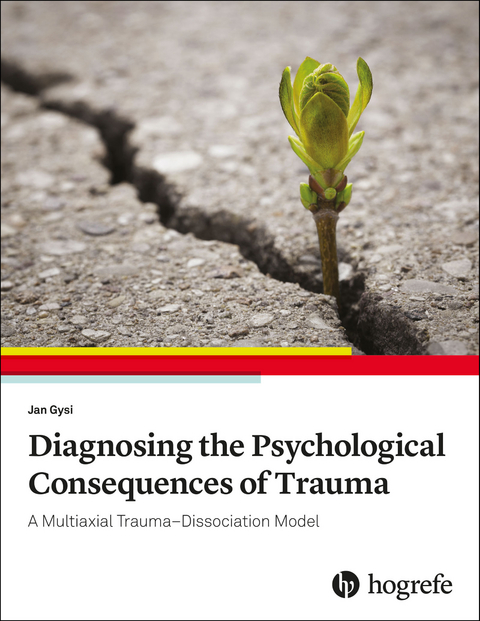
Diagnosing the Psychological Consequences of Trauma
Hogrefe Publishing (Verlag)
978-0-88937-636-6 (ISBN)
- Noch nicht erschienen (ca. März 2025)
- Versandkostenfrei
- Auch auf Rechnung
- Artikel merken
Tremendous progress has been made in the diagnosis and treatment of the consequences of trauma over the past two decades, which have led to significant changes being introduced in the ICD-11. Navigating this wealth of new knowledge in psychotraumatology, as well as keeping track of the various posttraumatic symptoms and disorders that can present in clients, can be challenging.
The brilliantly structured, full-color navigation charts in this volume help both early career and experienced professionals to keep track of the variety of diagnostic options to be considered or excluded while not overlooking anything. After an introduction to the trauma-dissociation axis model, the five axes are then presented in detail, including case examples, differential diagnoses, recommendations, decision paths, and questionnaires:
* Axis I: Personality disorders (including, borderline)
* Axis II: Disorders specifically associated with stress (including, PTSD, CPTSD, and prolonged grief disorder)
* Axis III: Structural dissociation of the personality (dissociative and partial dissociative identity disorder)
* Axis IV: Other dissociative disorders (dissociative neurological symptom disorder, depersonalization-derealization disorder, dissociative amnesia)
* Axis V: Comorbid disorders
The last two chapters provide an overview of the special diagnostic aspects of reporting to law enforcement agencies, and a catalog of questions collated by the author to help guide diagnosis and inform treatment. This volume is an exceptional resource for psychiatrists, clinical psychologists, psychotherapists, and other mental health professionals who work with traumatized individuals.
Jan Gysi, MD, is a psychiatrist and psychotherapist in private practice in Bern, Switzerland with over 20 years experience in the field of trauma and dissociation. He ist the author of several publications on trauma and dissociation and its implications in psychotherapy and law enforcement. He speaks at workshops, conferences, and seminars and works as a Supervisor.
Foreword
Acknowledgments
1 Trauma-Dissociation Axis Model for
Systematic Diagnosis of Trauma Sequelae
1.1 Introduction
1.2 Trauma
1.3 Assessment of Adversity and Traumatic
Experiences
1.4 Five-Axis Model for Systematic Diagnosis
of Trauma Sequelae
1.5 Diagnostics and Therapy Planning Within
the Framework of the Five-Axis Model
2. TD Axis I: Personality Disorders
2.1 Introduction
2.2 Personality Disorders in ICD-11
2.3 Diagnostics in the Context of Trauma
Therapy
3 TD Axis II: Specific Stress-Related
Disorders
3.1 Introduction
3.2 Traumatizing Events and Processes
3.3 Post Traumatic Stress Disorder (6B40)
3.4 Complex Post Traumatic Stress Disorder
(6B41)
3.5 Prolonged Grief Disorder (6B42)
3.6 Adjustment Disorder (6B43)
3.7 Continuous Trauma Disorder
4 TD Axis III: Structural Dissociation of
Personality
4.1 Introduction
4.2 Diagnostic Requirements
4.3 Evaluation
4.4 Challenges for Diagnostics
4.5 Normal Ambivalence, Ego States, and
Personality States
4.6 Questionnaires
4.7 Diagnosis of Structural Dissociation
4.8 Evaluation
4.9 Further Specialized Diagnostics
5 TD Axis IV: Other Dissociative Disorders
5.1 Introduction
5.2 Dissociative Symptoms at the Border of
Somatics and Psychiatry
5.3 Somatoform and Psychoform Dissociation
5.4 Dissociative Neurological Symptom
Disorders
5.5 Dissociative Amnesia (6B61)
5.6 Depersonalization-Derealization Disorder
(6B66)
5.7 Trance
6 TD Axis V: Comorbid Disorders
6.1 Introduction
6.2 Addiction Disorders
6.3 Eating Disorders
6.4 Compulsive Disorders
6.5 Depression
6.6 Anxiety Disorders
6.7 Bipolar Disorders and Schizophrenia
6.8 Attention Deficit Hyperactivity Disorder
6.9 Autism Spectrum Disorder
6.10 Maladaptive Daydreaming
6.11 Physical Diseases
6.12 Physical Injuries
6.13 Factitious Disorders
7 Diagnostic Aspects for Reports to Law
Enforcement Agencies
7.1 General Challenges With Credibility
7.2 Overview of Credibility Issues for Victims
of Sexual Offences
7.3 True or False Memories in Traumatized
People
7.4 Conclusions
8 Question Overview
8.1 TD Axis I: Personality Disorder Assessments
8.2 TD Axis II: Clarification of Specific
Stress-Related Disorders
8.3 TD Axis III: Clarifications of Structural
Dissociation
8.4 TD Axis IV: Clarification of Dissociative
Symptoms
8.5 TD Axis V: Clarification of Comorbid
Diseases
| Erscheinungsdatum | 30.04.2024 |
|---|---|
| Verlagsort | Toronto |
| Sprache | englisch |
| Maße | 215 x 279 mm |
| Themenwelt | Geisteswissenschaften ► Psychologie ► Klinische Psychologie |
| Geisteswissenschaften ► Psychologie ► Persönlichkeitsstörungen | |
| Geisteswissenschaften ► Psychologie ► Traumatherapie | |
| Medizin / Pharmazie ► Medizinische Fachgebiete ► Psychiatrie / Psychotherapie | |
| Schlagworte | multiaxial diagnostic system • PTSD • Trauma |
| ISBN-10 | 0-88937-636-0 / 0889376360 |
| ISBN-13 | 978-0-88937-636-6 / 9780889376366 |
| Zustand | Neuware |
| Haben Sie eine Frage zum Produkt? |
aus dem Bereich


